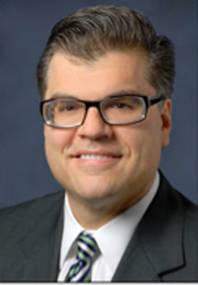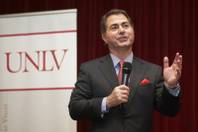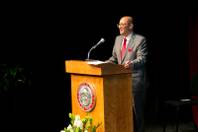Published Monday, Nov. 17, 2014 | 8:57 a.m.
Updated Monday, Nov. 17, 2014 | 5:35 p.m.

Dr. Ricardo Azziz, candidate for president of UNLV

Dr. Len Jessup, Candidate for President of UNLV, on November 12, 2014.

UNLV Executive Vice President and Provost John Valery White speaks to students and faculty at the State of the University address, Thursday Sept. 12, 2013.
Related stories
- UNLV search panel selects Arizona dean as next president
- Business background shaped vision of UNLV presidential candidate Jessup
- UNLV presidential candidate Azziz shares his vision for school
- University must play larger role in Las Vegas, says UNLV presidential candidate
- 3 finalists named for UNLV president
- Search for next UNLV president raises red flag for one regent
- Regents settle on Georgia firm to lead search for UNLV president
After a week of forums, interviews and meetings, the UNLV President Search Committee is meeting today to make a recommendation for the university’s 10th president.
The committee will choose among Georgia Regents University President Ricardo Azziz, University of Arizona Eller College of Management Dean Len Jessup and UNLV Executive Vice President and Provost John Valery White.
Each candidate brings a different background to the position.
Azziz has helped merge Georgia Health Sciences University — a medical school — and Augusta State University into one school. He is a medical doctor and has worked at UCLA and the University of Alabama-Birmingham.
Jessup held positions as an administrator and faculty member at business schools at Washington State University and Indiana University before moving to Arizona.
White, meanwhile, has a background in law working as UNLV’s Boyd School of Law dean before becoming provost.
Azziz, Jessup and White are in the running to replace former UNLV President Neal Smatresk, who left in 2013 to become president at North Texas University. Don Snyder has been acting president of UNLV.
The committee placed each candidate through a 90-minute interview before coming to a decision. Members asked questions about how the candidate would obtain funding for the university and medical school, their vision for Tier One, their management style and promoting diversity on campus.
Prior to White’s interview, Jerry Baker from research firm Baker and Associates, said he had never seen more divisive comments for a candidate. Some in the survey for UNLV’s next president applauded White for his intellect, speaking ability and leadership. Others were concerned that he was a micromanager, wasn’t transparent and not qualified for the job.
Still, White received support during the public forum, including from the faculty senate and maintenance staff.
During the interview White focused on his experience at UNLV. To reach Tier 1 status, White said the university needed to serve the needs of the community, which also represents what the country’s population may look like in the future. But it also needs more funding.
He stressed a need for strong athletic programs, finding funding resources from both strong alumni associations and new sources in the community and the need to graduate kids at a faster rate.
White also addressed concerns about his role advising acting president Snyder to call an academic review on a report about the margins tax, which was recently voted down. He said he was acting as an adviser and did it in support of the leadership ahead of him.
Ultimately, White said he was prepared to stay as UNLV’s president for as long as the school allowed him.
“This community has embraced me in the eight years that I’ve been here,” White said. “I’ve made it my own. I’ve fallen in love with UNLV and the promises for the future. All of it makes me excited for this job prospect.”
Jessup’s interview followed that of White. Baker said that Jessup received more positive reviews with people saying he was creative, innovative and got along with administration. They also praised his experience as dean at Arizona.
While Jessup doesn’t have any experience as president, he said his accomplishments at University of Arizona and Washington State University have prepared him. He said he had helped make the business school self-sustaining with funding, and didn’t require any help from the state. He stressed that he would do the same to minimize state funding for UNLV.
Some regents on the committee questioned his lack of experience as president and how Jessup would lead the university. Jessup pointed to the fact that he managed with a collaborative style and helped deans on campus receive funding for their programs to realize their vision for their schools.
“I think I’m more than a businessman and a business school dean,” Jessup said.
He also added that he could be prepared to take over the position as soon as possible.
Jessup also addressed questions about his involvement in an inappropriate email exchange with a female employee at Washington State University while he served as a member of the president’s cabinet. He said he was divorced at the time and the co-worker had interest in him, and he was pursuing that interest.
“The lesson I learned from that is when you’re in a prominent position, whether you’re in a small town or large town, you have to be extra careful and diligent about what you do and say and how you carry yourself,” Jessup said.
Azziz was the final candidate interviewed. Baker said he received support from two faculty groups on campus. People who filled out the survey were concerned that he lacked experience beyond health sciences, did not seem to know enough about UNLV. Others said he was the only qualified candidate and felt he would push UNLV to “greatness."
Baker and Chancellor Dan Klaich also addressed Azziz’s controversies at GRU.
News stories out of Augusta, Ga., reported that he used a school bus for transportation and campus police for security for his niece’s wedding and attempted to build a $75,000 carport at the president’s home without regent approval. In addition, frustration swirled in Augusta over not including the city’s name in the university.
Klaich said he had reviewed the incident and spoke with officials in Georgia, who told him it wasn’t an issue. So he decided to move forward with Azziz as a candidate. At the end of the interview, Azziz addressed the issues, explaining that they were both misunderstandings.
When it came to the name change, he said that he was supporting the state’s Board of Regents, who voted on it.
During the interview, Azziz focused on his ability to fundraise while in Georgia. He shared experiences persuading a frustrated alumnus to donate $10 million to the school, and that when the donor passed away, he donated $66 million.
He also spoke about being able to expand the student base by forming partnerships with the school district and community college, obtaining partnerships with hospitals in the community for the medical school, and developing a collaborative management style.
While Azziz is still president at GRU, he said UNLV offered a unique opportunity.
“UNLV is perfect institution because you are poised to move to that next level,” Azziz said. “Your faculty and regents all seem to be saying the same thing, we want a great university in Las Vegas.”
The committee will discuss the candidates and then potentially select its final candidate for president.

Join the Discussion:
Check this out for a full explanation of our conversion to the LiveFyre commenting system and instructions on how to sign up for an account.
Full comments policy